SAR Scenario Rolling Stock V2
From TrainzOnline
(Difference between revisions)
m |
|||
| Line 5: | Line 5: | ||
</tr> | </tr> | ||
<tr valign="top"> | <tr valign="top"> | ||
| − | <td align="center" colspan=2>For the '''[[SAR Peterborough Base Session|SAR Peterborough Base Session V2.0]]'''</td> | + | <td align="center" colspan=2>For the '''[[SAR Peterborough Base Session V2|SAR Peterborough Base Session V2.0]]'''</td> |
</tr> | </tr> | ||
<tr valign="top"> | <tr valign="top"> | ||
| Line 363: | Line 363: | ||
<tr valign="top"> | <tr valign="top"> | ||
<td>[[image:SAR 700.png|link=|alt=SAR 700 Coach]]</td> | <td>[[image:SAR 700.png|link=|alt=SAR 700 Coach]]</td> | ||
| − | <td>'''Broad Gauge''' (1600mm - 5ft 3in) passenger | + | <td>'''Broad Gauge''' (1600mm - 5ft 3in) passenger coach commonly used on '''SAR''' express passenger services from '''Adelaide''' to '''Port Pirie''' and '''Terowie'''.</td> |
</tr> | </tr> | ||
<tr valign="top"> | <tr valign="top"> | ||
Revision as of 10:41, 15 October 2024
 Peterborough Division Rolling Stock Peterborough Division Rolling Stock |
|
| For the SAR Peterborough Base Session V2.0 | |
| Updated for SAR Peterborough Base Session v2.0. For the original V1.0 version click here | |
| Locomotives | ||||
|
SAR T Class 4-8-0 |
||||
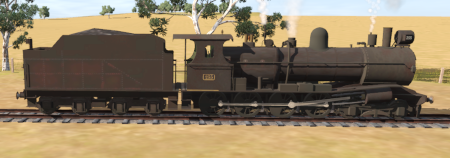 |
78 were built between 1910 and 1917 specifically for the Broken Hill-Port Pirie ore trains where they dominated until the mid 1960s. They were regarded as one of the most successful SAR steam locos. 6 were sold to the Tasmanian Government Railways (TGR), a few were transfered to other SAR narrow gauge divisions and 5 were temporarily converted to broad gauge (5ft 3in, 1600mm) during a shortage of broad gauge locos. The vast majority saw out their lives on the SAR Northern (Peterborough) Narrow Gauge Division. The last examples were withdrawn from service in the early 1970s. | |||
| Consumes: Coal and Water | ||||
|
||||
|
SAR Y Class 2-6-0 |
||||
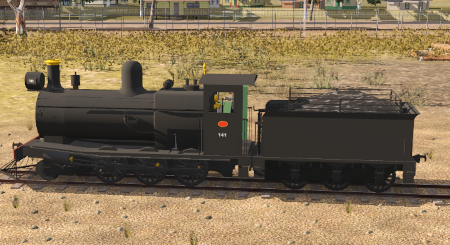 |
129 entered service on the SAR narrow gauge systems between 1885 and 1889, some where purchased second hand. They became the backbone of the SAR narrow gauge systems for many decades. The last was withdrawn from service in 1970. The class was widely used by other narrow gauge systems. | |||
|
||||
|
SAR 300 Class 4-8-2+2-8-4 |
||||
 |
The ASG (Australian Standard Garratt) narrow gauge locos were built from 1943 to 1945 as an emergency measure to aid the war effort. 6 were purchased second hand by the SAR in the early 1950s and were designated the 300 class. They were to fill a loco shortage for the Broken Hill to Port Pirie ore trains. The 400 class locos had been ordered for this service but their delivery had been delayed. The 300 class entered service in the SAR in 1953/54 and all were found to be in poor condition. The class was condemned in February 1956. | |||
|
||||
|
SAR 400 Class 4-8-2+2-8-4 |
||||
 |
10 of these oil fired Garratts were purchased in the 1950s specifically for the Broken Hill-Port Pirie ore trains and the Leigh Creek coal trains. Most had been withdrawn by the mid 1960s. The last was withdrawn from service in 1970. | |||
| Consumes: Bunker C Oil and Water Bunker C Oil is available at Gladstone Depot and Peterborough (Main) Depot |
||||
|
||||
|
SAR 620 Class 4-6-2 |
||||
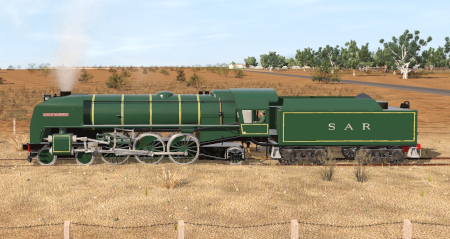 |
10 were built in 1937-1938 for use on the broad gauge (5ft 3in, 1600mm) network. They operated on all but the lightest of branch lines. All had been withdrawn from service by 1969 but one, No. 621, still operates on the Heritage Victor Harbour Line. Another, No 624, is on display in the National Railway Museum. | |||
| Consumes: Coal and Water | ||||
|
||||
|
SAR 830 Diesel |
||||
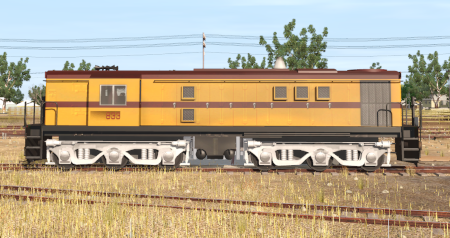 |
An ALCo DL531 diesel that was once common, in a variety of forms, on all Australian railways. The 830 class locos first appeared in the SAR in the 1960s. By 1970 they had 45 units in 3 different gauges (narrow, standard and broad), 13 of them were narrow gauge. They are still in operation on the SAR today but several have been remodelled by redesigning the "nose" at the cab end creating a continuous front window across the width of the cab to provide better driver vision. The narrow gauge units operated in the Peterborough Northern and the Eyre Peninsular Divisions and were mostly used to haul mineral and ore trains. The models used here are actually standard gauge (4ft 8½in - 1435mm) as no versions with narrow gauge bogies are available on the DLS. |
|||
|
||||
| Motor Coaches | ||||
|
SAR SMC (Steam Motor Coach) |
||||
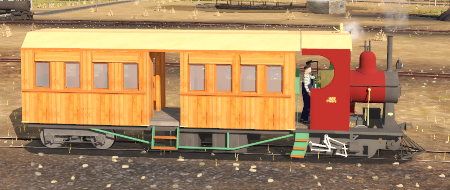 |
Affectionately known as the "Coffee Pot", the SMC consists of an engine unit and a passenger coach. The coach is attached to the loco by a pivot beneath the firebox and the loco cab floor is part of the coach frame. Only two SMC units were built. SMC 1 spent its entire working life (1905 - 1932) based at Quorn where it ran weekly mail and parcel services to Hawker. It was also used on weekend passenger charters as far as Port Augusta and Orroroo. After the line to Hawker was transferred from the SAR to the Commonwealth Railways (CR) in the early 1920s it was reclassified as CR NJAB 1. In 1932 it was placed into storage at Quorn and then on static display at Alice Springs station. In 1984 it was returned to Quorn and restored to full operating condition. SMC 1 is the only known working example of its type in the world. It is currently used for passenger tourist excursions on the Pichi Richi Railway between Quorn and Woolshed Flat. |
|||
|
||||
|
RM Railmotor and PL Trailer |
||||
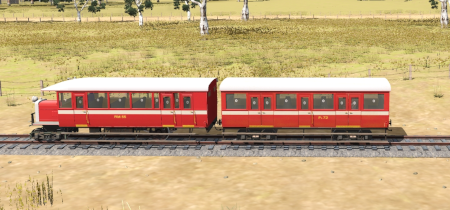 |
"Borrowed" from Queensland Rail (QR) but it does very vaguely (if you squint) resemble the SAR 75 Class Railcars that operated in the division. They were used throughout the SAR Narrow and Broad Gauge networks from the 1920s to 1969 when they were withdrawn from service. |
|||
|
||||
|
Wolseley Rail Car |
||||
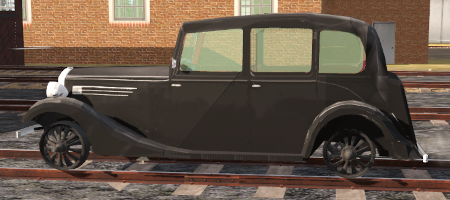 |
A 4 seat petrol driven rail car converted from a Wolseley road motor vehicle (late 1930s to early 1940s model). This was mostly used for track inspection and crew transport work. Currently at the Peterborough Steamtown Rail Preservation Society Museum. | |||
|
||||
| Passenger Coaches | ||||
|
CL (Composite Lavatory) Coach |
||||
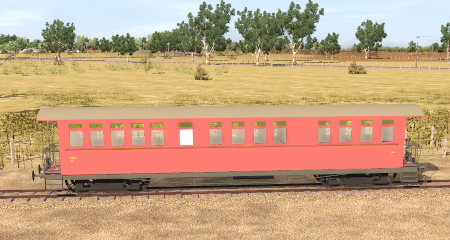 |
"Borrowed" from Queensland Rail (QR). The CL coaches were composite 1st Class (at one end) and 2nd Class (at the other end). Between the two classes there was a lavatory. | |||
| Loads and Unloads: Passengers | ||||
|
||||
|
CLV (Composite Lavatory Guards Van) Coach |
||||
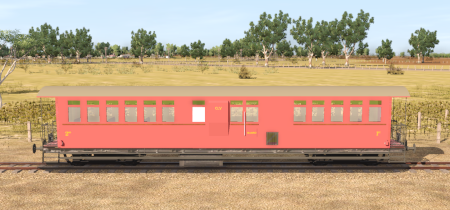 |
"Borrowed" from Queensland Rail (QR). The CLV coaches were composite 1st Class (at one end) and 2nd Class (at the other end). Between the two classes there was a lavatory and a guard's compartment. | |||
| Loads and Unloads: Passengers | ||||
|
||||
|
BLV (Brake Lavatory Guards Van) Coach |
||||
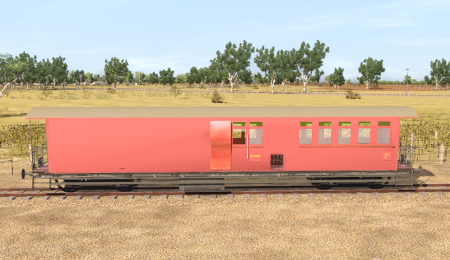 |
"Borrowed" from Queensland Rail (QR). The BLV coaches were Brake Vans and had a 1st Class passenger compartment at one end, a guard's compartment and lavatory in the middle and a baggage compartment at the other end. | |||
| Loads and Unloads: Passengers | ||||
|
||||
|
BGV (Brake Guards Van) Coach |
||||
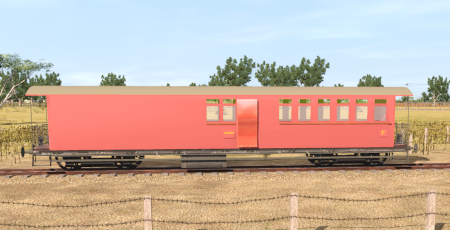 |
"Borrowed" from Queensland Rail (QR). The BLV coaches were Brake Guards Vans and had a 1st Class compartment at one end, a guard's compartment in the middle and a baggage compartment at the other end. | |||
| Loads and Unloads: Passengers | ||||
|
||||
|
SAR 700 Class Coach |
||||
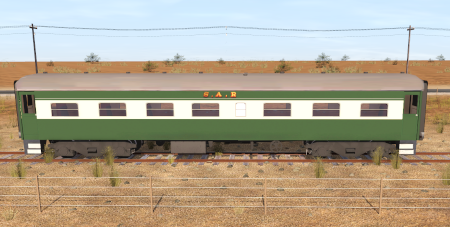 |
Broad Gauge (1600mm - 5ft 3in) passenger coach commonly used on SAR express passenger services from Adelaide to Port Pirie and Terowie. | |||
| Loads and Unloads: Passengers | ||||
|
||||
| Guard and Brake Vans | ||||
|
CR NH Brake Van |
||||
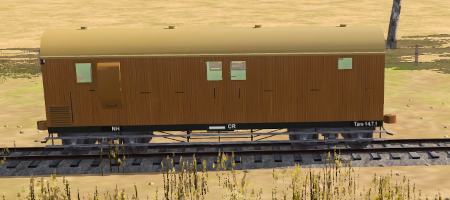 |
Built for the Commonwealth Railways (CR) it also operated on parts of the SAR Northern Division. | |||
| Loads and Unloads: Luggage | ||||
|
||||
|
SAR 7550 Brake Van |
||||
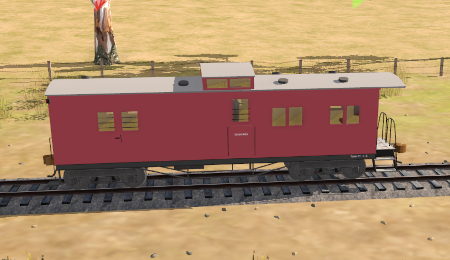 |
Composite brake van that can carry a limited number of passengers. Entered service in 1938. | |||
| Loads and Unloads: Up to 3 Passengers | ||||
|
||||
| Freight Wagons | ||||||||||||
|
MTW Flat Wagon |
||||||||||||
 |
"Borrowed" from Queensland Rail (QR), designed to carry bulky loads. | |||||||||||
|
||||||||||||
|
CR Flat Wagon |
||||||||||||
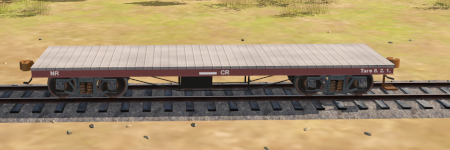 |
Commonwealth Railways (CR) 32ft flat top wagon, designed to carry bulky loads. | |||||||||||
|
||||||||||||
|
QLX Van |
||||||||||||
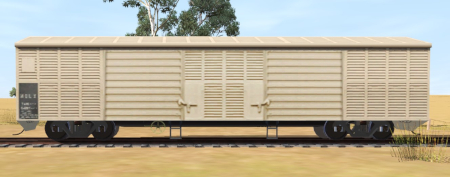 |
"Borrowed" from Queensland Rail (QR), a general purpose goods van. | |||||||||||
|
||||||||||||
|
CCC Gondola |
||||||||||||
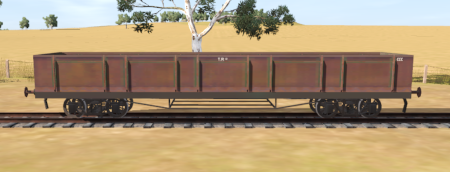 |
"Borrowed" from Tasmanian Government Railways (TGR), a bulk mineral wagon. | |||||||||||
| Loads and Unloads: Coal (representing mineral ores) | ||||||||||||
|
||||||||||||
|
Sheep 4-wheel Van |
||||||||||||
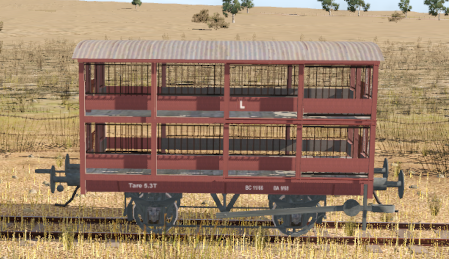 |
"Borrowed" from Queensland Rail (QR), a general purpose sheep van. | |||||||||||
| Loads and Unloads: Merino Sheep | ||||||||||||
|
||||||||||||
|
QR K Cattle Wagon |
||||||||||||
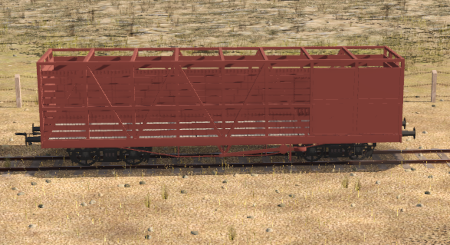 |
"Borrowed" from Queensland Rail (QR), a general purpose cattle van. The KKB variant is also used which has two end compartments, one for a Drover (a "shepherd") and the other for a Guard. | |||||||||||
| Loads and Unloads: Hereford Cattle | ||||||||||||
|
||||||||||||
|
CR NGS Open Wagon |
||||||||||||
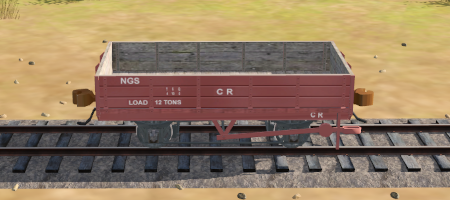 |
Commonwealth Railways (CR) general purpose 4 wheel open wagon. Entered service in two batches, in 1925 and 1949. | |||||||||||
| Loads and Unloads: General Goods | ||||||||||||
|
||||||||||||
|
WHE Covered Grain Wagon |
||||||||||||
 |
"Borrowed" from Queensland Rail (QR), a covered bulk grain gondola wagon. This wagon is not industry enabled. I could not find a suitable narrow gauge industry enabled grain wagon on the DLS but in appearance the QR WHE wagon is a close match to those that were used on the SAR. | |||||||||||
| Pretends to Load and Unload: Wheat | ||||||||||||
|
||||||||||||
|
CR NTB Water Tanker |
||||||||||||
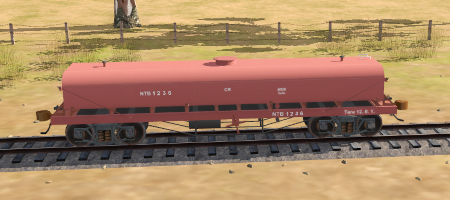 |
Commonwealth Railways (CR) water tank wagon. Reliable water sources were scarce on the Central Australia Railway so water tankers were used to replemish water towers and were often included in consists to directly supply locos with water. | |||||||||||
| Loads and Unloads: Water | ||||||||||||
|
||||||||||||
|
Tank 4-wheel |
||||||||||||
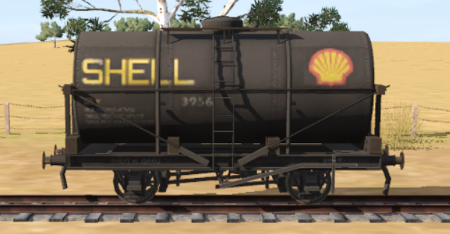 |
A bulk fuel wagon. | |||||||||||
|
||||||||||||
| Links: All links will open in this window | |||||||
 Session Scenarios |
 Location Index |
 Drive Tutorial |
 Loco Roster |
 Active Industries |
|||